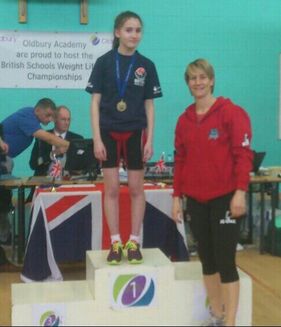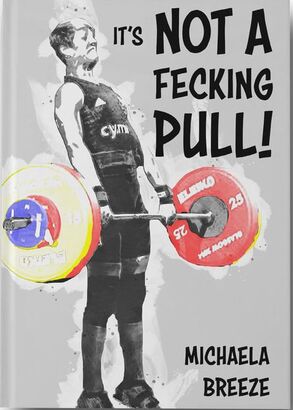AuthorA 20 year old fitness enthusiast and dedicated Olympic style weightlifter. I am a Level 2 Weightlifting coach, Powerlifter, and non-competitive Irish dancer. I'm determined to live a healthier lifestyle and take care of my body whilst influencing other young people to do so. I never doubt my ability to achieve something; I just change what I'm doing until I succeed. Archives
May 2021
|
Back to Blog
'It's Not A Fecking Pull' Book review13/9/2019  This blog post is a review of the book entitled 'It's Not A Fecking Pull' written by Commonwealth Games Champion and British record holder, Michaela Breeze MBE. Although Michaela and I have not officially spoken, she presented a medal to me back in 2015 at the British Schools Championships at Oldbury Academy. I must admit, being only thirteen years old at the time, I had no idea who Michaela Breeze was! (Although I knew she must've been somebody important, as she was presenting the medals and my coach made a big deal out of it). A few years after that competition, I stumbled across Michaela's Instagram and I have since kept up with her posts and her insightful Weightlifting advice. I have been really excited to read and review this book, so I hope that you enjoy reading my review. Cover and layout Available to purchase from powerful ideas press for £20 Available to purchase from powerful ideas press for £20 The front cover of this book really stands out to me. Not only have we got the pop of colour from the Eleiko weights, but the lifting position Michaela is demonstrating is very relevant to the title of the book. This phase of the lift is demonstrating what a Weightlifter should do instead of the misconception of pulling with the arms or swinging the barbell out from the hips. It is really nice to see Michaela fully kitted-out on the cover, it suits the covers' exclamation alongside with the bold title. The blurb of this book is concise and shows that this book is mixture of her autobiographical accounts and her advice from over the past three decades of Weightlifting. I particularly enjoyed the layout (and not just because my copy is signed). Before each part of the book, Michaela writes about her own stories as a Weightlifter which relates well into what is being discussed within the next chapter. Because of this, I actually believe I read the book quicker and absorbed more information since I was eager to understand how Michaela's story related into the advice she was giving. With some books, grammar errors slip through. There were some that I spotted within the book, but nothing that completely deferred me from understanding the point of the sentences. I am guessing there was a printing error involving page numbers from chapter 2 onwards, but this does not reflect the quality of the Weightlifting information in the book itself. Throughout the book, Michaela also refers back to other chapters. This is great if there are pages and chapters that the reader needs reminding about. The price of this book being only £20 is astounding, from the amount that I have learnt from this book, I am impressed that this level and depth of knowledge into the sport of Weightlifting is not being sold for more! This book is by far worth every penny, whether you are a beginner to Weightlifting or an experienced coach. If you are interested in purchasing this book, please click on the image to be directed to the Publishers website to purchase a copy. IntroductionStraight away Michaela gets to the point that technique is important, which again really shows the coaching principles she follows. I loved every bit of honesty portrayed within this introduction, even surrounding the risky topic of National Governing Bodies. Michaela's personality seems to shine in the idea that she is independent and that she has been through all ups and downs within Weightlifting. I mean, to be an incredible female Weightlifter during an era when Women weren't really viewed as 'socially acceptable to compete'; Michaela truly has lived through the sport even at its most adverse times. The opinions and morals that were presented within the introduction were later elaborated on within the chapters, I much prefer opinions mixed with facts over a book containing nothing but factual information. "The technical and mental sides to the sport are often neglected." - Michaela Breeze Part one: Getting startedThe first part to Michaela's story explains Michaela's background within Weightlifting as a beginner and her progression into a Commonwealth games champion. It's personal, interesting and opinionated; I love it. This part also impacted an educational decision of mine. From my own personal perspective, I am currently writing my personal statement for University. I was 90% sure I wanted to pursue a course in Physical Education and Sport and 10% keen to pursue a course related to Health and Social Care. The reason I wasn't 100% sure about taking a degree in Physical Education was because I wanted to still be able progress within my Weightlifting out of the career and still include Coaching Weightlifting within my life. I found out that Michaela was a PE Teacher and that she learnt Weightlifting from her school PE teacher. I thought to myself that I've always wanted to teach Weightlifting within a school environment and how much Michaela progressed from teaching PE to coaching Weightlifting seminars, so here I am now: 100% sure I want to pursue a degree in Physical Education. Chapter one and two included understandable terminology that isn't going to confuse a beginner nor be too basic for an experienced Weightlifter or coach. Scientific terminology within books is really not for me when it comes down to learning about the technical model and principles that a coach holds. I felt that the information within the book wasn't biased towards a particular audience; I was able to relate and understand concepts from my point of view as a Coach and a Weightlifter. Michaela discusses what works for her as a coach and doesn't just base her knowledge upon what has been assumed as factual for years within the sport. This book is definitely a refresher for the technically old-minded ones, that is what makes it stand out from other Weightlifting books. Shifting further into Chapter 2, I feel that the absence of using the word 'pull' within Michaela's technical model will be a step forwards for many lifters and coaches. I don't want to reveal too much about the technical model, but I must mention that I couldn't agree more that British Weightlifting should change the phrase of 'First and Second Pull' to an alternative term. I related to chapter 3 quite a bit. I write my own training programs and sessions for the youths I coach. This chapter highlights how you can analyse your lifts. I actually watched back some of my old videos to spot the technical errors that Michaela mentioned; I would now know how to fix these errors if presented with them again or if one of my youth lifters developed a technical issue. I believe that these small adjustments will allow for me to make better gains in the future and will make the lifts within my program feel more challenging. I felt that chapter 4 really expanded upon some of Michaela's Instagram videos (@MichaelaBreeze). For example, she showed an expansion of knowledge surrounding the topic of foam rolling, some of this which I'd also seen upon her Instagram. A lot of Weightlifting content and tips is online nowadays, so it's really nice to receive more content within a physical book. This also helps for those without access to social media to still read updated information surrounding Weightlifting. There were many descriptions of 'how to lift' within this chapter. I found this information easy to comprehend and I believe it is definitely possible for a coach to teach straight from this book or for a beginner to teach themselves. I learnt a lot from this chapter, including why lifters complete the exercise of 'pulls'. I also learnt insight upon how to coach crossfitters who are practicing Weightlifting movements; I have never coached a crossfitter before. A big thing within this chapter was all about Michaela showing her Weightlifting advice through her past lifting experiences. She highlighted areas surrounding injury prevention and plyometric training, although this didn't contain too much detail, just enough information was provided to keep me further intrigued in the topics. Part two: Reaching the topMy story and chapter 5 This was probably my favourite chapter of them all. The 'my story' introduction to this chapter was amazing to read and really helps you to understand Michaela's perspective during her competitive days. I already knew she was a great coach, but her background story is rather inspirational. Her personal experiences definitely show her off as a coach. "This taught me that no one cares about you in sport unless you are achieving results", as sad as this may seem, this is still a principle that still stands today. Obviously from this experience, Michaela shows that she cares about her athletes and not just the athletes who are national and international competitors. This chapter features mental discussion and competition preparation, a lot of the information and tips I have never heard of before surrounding this. I'm definitely going to try the methods she mentioned about getting over mental blocks. Chapter 6, 7 and 8 Chapter 6 contained programming information which wasn't tailored, but included just enough information to act as a guideline to any coach or beginner that wants to begin Weightlifting. Chapter 7 talked about what to eat post weigh-in, I've never really thought about reading up around the topic as I usually weigh-in easily so don't feel as if what I eat should be a huge focus. However, this chapter has completely changed my views surrounding the importance of food after a competition weigh-in. The topic of anti-doping is discussed within Chapter 8. This is a huge interest of mine and I'm glad the topic was written in a manner that people can see that doping should be stopped. Part three: CoachingMy story and chapter 9 Michaela's competition stories are really exciting to read and I was kind of saddened that this was the last part to her story. From reading all of the inserts from her life, I can say that she has worked incredibly hard throughout her sporting career. It makes you realise that everything is achievable if you put the effort in. Michaela talks about the responsibility that a coach must have over their athlete and she is completely right! If the athlete is prepared and dedicated, then the coach should be too. Chapter 9 featured some interesting and different topics such as: parents, growth spurts, fun in training, warm-up room tactics and that some males are very weight focused rather than having the view that their technique will get the weight up there (this one is from personal experience!). "The harder you work, the luckier you get" - Michaela Breeze Thank you for reading this book review. I've learnt twenty new pieces of information from this book! All which I will apply either into my coaching, training or competing. This book has been amazing to read and has definitely changed my opinions and perspectives upon certain topics in Weightlifting; I would rate it 5/5. Thank you to Dan Kent who kindly asked if I would review Michaela's book. This was a very generous offer and I have very much enjoyed reviewing another book for Powerful Ideas Press.
0 Comments
Read More
|